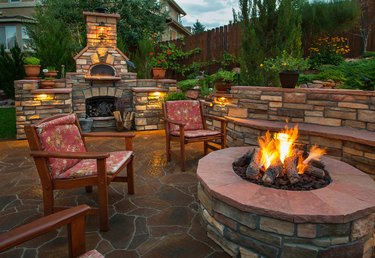
People like to think of rocks as heavy, stable, unchanging things, but rocks can be volatile objects in particular situations. While it might take years for a river to smooth the edges of a jagged rock, the high and uneven heat of a fire can cause rocks to explode in a matter of minutes. Technically, all rocks could explode in a fire given the right conditions, but the reality is that this is a much more common occurrence with some types than others. Since exploding rocks are highly dangerous, it's important to only line firepits with the right types of stones.
Why Do Rocks Explode?
Video of the Day
When rocks burst apart in a fire, it is not due to any form of combustion as you might typically envision when you think of explosions. Instead, the rocks burst open due to rapid internal pressure changes. This can be caused by either the rock containing moisture inside (which heats at a much higher rate than the surrounding stone) or by the rock being a compound of different materials that have drastically different physical properties and typically also have small air pockets inside. Either way, the water, air, or minerals that heat up quickly expand, pressurizing the more slowly heating minerals around them. The result is that the stone may violently break apart.
Video of the Day
What Rocks Should Be Avoided?
Porous rocks tend to hold a lot of moisture even when they feel bone dry, which means they should be avoided for use in fires. This list includes limestone, sandstone, slate, pumice, shale, river rocks, pea gravel, basalt, soapstone, conglomerate rocks, and metamorphic rocks. Many of these rocks, including limestone, sandstone, soapstone, conglomerate rocks, and metamorphic rocks, are also made from multiple minerals that may heat at different rates and may also contain defects on the inside, both of which can contribute to explosions.
What Rocks Are Safe?
Generally speaking, harder and denser rocks are a safer bet because they are typically nonporous. In fact, the best rocks for a firepit are those that are not only nonporous but were also exposed to extreme heat in their formation. Look for materials like granite, marble, gabbro, anorthosite, syenite, hornfels, skarn, or quartzite.
Even when using rocks that are considered safe to use in and around fires, avoid using these rocks when they are wet, particularly if it has recently rained. This is because wet rocks are more likely to explode than dry ones. If you know you want to use a firepit shortly after an upcoming rain, store your rocks or movable firepit in a dry area if possible and only set them out after the rain has stopped and you are ready to light your fire. You may also consider investing in a waterproof firepit cover if it's not possible to move your firepit.